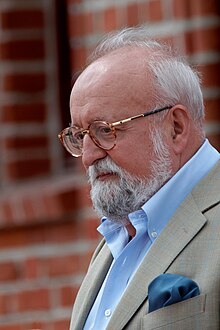Polish Requiem
| Polish Requiem | |
|---|---|
| by Krzysztof Penderecki | |

The composer in 2008
|
|
| Native name | Polskie Requiem |
| Form | requiem mass |
Polish Requiem (original Polish title: Polskie Requiem; German: Polnisches Requiem), also A Polish Requiem, is a large-scale requiem mass for soloists, mixed choir and orchestra by the Polish composer Krzysztof Penderecki. The Lacrimosa, dedicated to the trade union leader Lech Wałęsa, was written for the unveiling of a statue at the Gdańsk shipyards to commemorate those killed in the Polish anti-government riots in 1970. He expanded the work into a requiem, writing other parts to honour different patriotic events over the next four years. The Polish Requiem was first performed in Stuttgart on 28 September 1984. Penderecki revised and expanded the work in 1993, and expanded it again in 2005 with the additional movement, Ciaccona. It is called Polish Requiem because its parts are dedicated to heroes and victims of Polish history. One of the better-known works by Penderecki, the mass largely follows the liturgical Latin of the requiem format with the addition of Święty Boże, the Polish translation of the Trisagion.
During 1980, Penderecki was commissioned by the Polish trade union Solidarity to compose a piece to accompany the unveiling of a statue at the Gdańsk shipyards to commemorate those killed in the Polish anti-government riots in 1970. Penderecki responded with the Lacrimosa, dedicated to Lech Wałęsa, which he later expanded into this requiem, writing other parts in honour of different patriotic events. The Agnus Dei was composed in 1981 in memory of his friend, Cardinal Stefan Wyszyński. The Recordare was written in 1982 for the beatification of the Franciscan Maximilian Kolbe who had died in the Auschwitz concentration camp. The Dies irae was written in memory of the Warsaw Uprising of August and September 1944. Libera me, Domine was written commemorating the victims of the Katyn massacre. A first version of the requiem was performed on 28 September 1984 by the Stuttgart Radio Symphony Orchestra under the direction of Mstislav Rostropovitch.
...
Wikipedia
